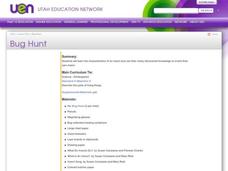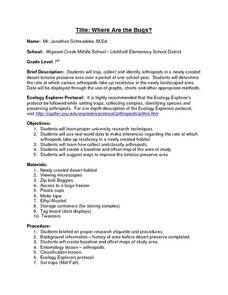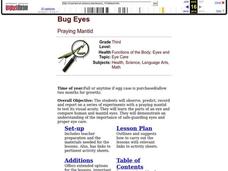Cornell University
Insect IPM
Find out the characteristics that makes a bug an insect with a workbook designed to inform scholars about the crawly creatures that live around us. Scholars complete an ant-themed word search, answer questions using a solution key, and...
Curated OER
Bug Detective
What happens when a living thing dies? After reading a paragraph of background knowledge on the life cycle of bugs, third and fourth graders work through four clues to figure out which bug is which. When they finish, they can study the...
Curated OER
Beneficial Bug Scavenger Hunt
Going on a scavenger hunt sounds like a great way to spice up any lesson plan. To better understand how beneficial insects are, the class goes outdoors to search for and observe a bug that has big benefits. Included in the lesson are...
Cornell University
Too Much of a Good Thing?
Continuing their study of beneficial insects, young entomologists discover where in the world some of these bugs are. By labeling, coloring, and using the scale on a map, pupils explore the territories and arrival of the Asian lady...
Curated OER
What Is An Insect?
Students find and classify insects. They collect insects, study them with a hand lens and identify its body parts. Afterwards, they discus various types of insects and thier Orders such as beetles, butterflies and moths, grasshoppers, etc.
EngageNY
Conducting Research: Analyzing a Variety of Sources to Capture Information about My Insect
From picture to words. Scholars analyze a picture of an ant and then list two facts they observed and any questions that may arise. Expert groups from the previous instructional activity then look at a diagram about either an ant or...
Curated OER
Just Plain Buggy: Art and Science
Budding artists explore the shapes and parts that make insects so fascinating to study, then use what they see to create original insect inspired designs. They use wax, dye, and fabric to create their designs.
Curated OER
Insects and Bugs
Young scholars recognize the difference between insects and bugs while making connections to personal experiences. In this insect and bug lesson, students complete a pre-assessment to demonstrate prior knowledge, then gather information...
University of Kentucky
Beneficial Bug Scavenger Hunt
Many people think of bugs as annoying pests to be squashed, but most insects and spiders are beneficial, eating the actual pests or pollinating plants. After reviewing some of the common bugs in your area (they may differ from those...
Curated OER
Bug Hunt
Students study the characteristics of an insect and use their newly discovered knowledge to invent their own insect. They go on a class bug hunt, using the tools and supplies that biologists use when they go out in the field.
National Park Service
The Young Naturalist
Beginning with a brief history of our 26th president, Theodore Roosevelt, then followed by a discussion of his interest in nature, young scientists take to the outdoors to locate and observe local plants and insects. Scholars return to...
Curated OER
Activity Plan 5-6: Bugs, Bugs, Bugs!
Students become entomologists for a day. For this life science lesson, students go on an insect hunt and investigate insects and their homes. This leads to the creation of an insect by each student. Lesson includes a take-home...
Curated OER
Insects
Students study the characteristics and basic needs of insects. They compare and describe similarities among insects. They examine the body structure, covering, and movement of insects and also, examine insect life cycles in this unit of...
Curated OER
Creepy, Crawly Critters
Students study characteristics of insects by creating models from an assortment of materials. They create rubrics showing what an insect must have and create an insect, using a bag of materials. They cut out the puzzle insects included...
Curated OER
Creepy Crawlers
Students study insects and spiders, and answer questions about the insects they have studied. They complete an insect word search, praying mantis color sheet, and spider and insect Venn diagram. They finish up with a trip to the local...
Curated OER
Where Are the Bugs?
Students trap, collect and identify arthropods in a newly created desert tortoise preserve area over a period of one school year. They determine the rate at which various arthropods take up residence in the newly landscaped area. Data is...
Curated OER
Bug Eyes
Third graders observe, predict, record and report on a series of experiments with a praying mantid to test its visual acuity. They study the parts of an eye and compare human and mantid eyes.
Forest Foundation
The Web of Life
Producers, herbivores, carnivores, omnivores, decomposers. To begin a study of the forest ecosystem, learners examine the connections among the members of ecological communities.
John Lentine
Butterflies and Bugs
Symmetry, line, shape, art, and math are all connected through a fun hands-on craft. Included are instructions to a classic activity, where learners create butterflies to show symmetry in nature and then discuss symmetry in math. It is...
Curated OER
I Wonder How Fast Manduca Grows Compared To Me
Students study the Manduca bug and its growth data. They look for patterns and compare their own growth rate to that of the Manduca.
Curated OER
Bug Sweep
Students observe and categorize insects. In this insects science lesson, students create a bug catcher out of a coat hanger and plastic bag, then collect bugs from the schoolyard. Students count and categorize the insects according to...
Curated OER
All About Bugs
Students read "The Very Hungry Caterpillar" and practice the days of the week. In groups, they create a puppet show, design cards of the "days of the week," draw their favorite part of the story, create a visual representation of each...
Curated OER
Spider Safari
Today we are talking about one of the stealthiest, sneakiest, and most intriguing insects of all times, the spider. Learners will examine the predatory nature of these super bugs as they conduct a spider safari survey. Each child will...
Curated OER
Meadow Study
Students examine insects they collect in a sweep nets. They identify as many of the insects as they can.

























